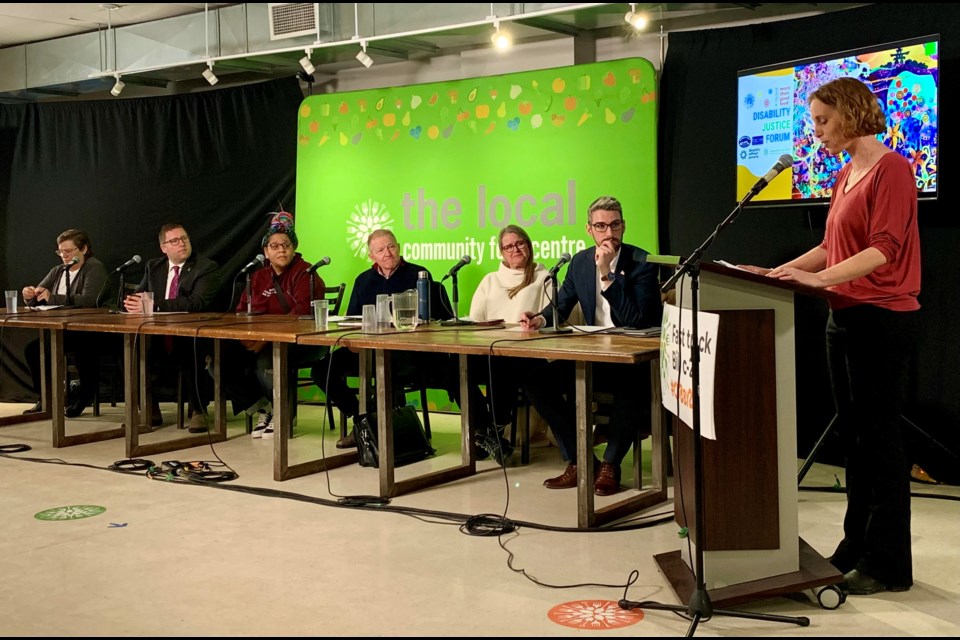The Local Community Food Centre in Stratford was the venue for a 'Disability Justice Forum', allowing a deep discussion about the hardships people with disabilities face and some potential solutions.
The forum gathered representatives of three levels of government, disability advocates and people who work with them and for them, people living with disabilities and their friends and families for a town hall-style event.
Guest speakers included Mirjam Schut, a lead independent facilitator at Facile Perth and one of the event's organizers, and Rabia Khedr, national director of Disability without Poverty.
Schut and her colleagues put together a panel Thursday night that featured Jill Temple, executive director of Partners and Planning, Karen Wood and Erin Jackson, disability justice advocates, John Nater, MP for Perth-Wellington, Matthew Rae, MPP for Perth-Wellington, and Martin Ritsma, Mayor of Stratford.
A question and answer period was moderated by Paul Cluff, Editor of StratfordToday.
Nater, who has been championing Bill C-22 in the House of Commons, clarified where the bill that aims to support the financial security of persons with disabilities is legislatively.
The bill is currently in the Senate which, as Nater pointed out, can take a longer to get through than the House of Commons. Should any amendments be recommended by the Senate, that can result in ”ping-ponging” as it bounces from Senate to House.
Nater said that at this point he does not foresee any amendments in the Senate.
The question of the night for many was whether or not the province would claw back their support in light of more federal funding, thereby negating what the bill aims to do.
Bill C-22 must be a benefit that sits upon other benefits in order to be successful, a number of people suggested.
Perth-Wellington MPP Matthew Rae said that although he does not have a crystal ball, whatever form that the new benefit will take – be it a top-up to the Ontario Disability Support Program (ODSP) or some other benefit – will be determined through a collective agreement with the federal government and the province (and every province and territory in Canada, he noted).
Rae also pledged to advocate for the province’s contribution to at least stay at the current level.
Bill C-22, as Nater pointed out, gives an obligation to work with people who have disabilities to co-create a benefit. It does not say who gets the benefit or how much or when it will start.
The forum included more than just discussion on Bill C-22.
Wood and Jackson were on the panel to discuss their lived experience with disabilities and the public (mis)conceptions about them.
Both women agreed that people living with disabilities often get accused of being lazy or unmotivated. Jackson went further, saying that those with non-visible disabilities have it even more difficult.
Wood compared living with disabilities to the early days of the pandemic, when things like restaurants and coffee shops were prohibited and people were told to self-isolate. Wood said she cannot afford a coffee living on disability, and her lifestyle is inherently isolating.
“I just want my dignity back,” Wood said.
Aside from daily impacts, long term barriers like housing and transportation were also discussed.
Earlier that morning, the province announced more funding for public transportation in Perth County – a total investment of $871,984, with Stratford receiving just over half of that money.
Mayor Ritsma called the investment “beautiful” and said that it will dovetail well into the city’s contribution.
On the topic of housing, Nater expressed frustration when it comes to finding affordable housing in rural areas.
“A one size fits all approach when it comes to housing doesn’t work,” he said. “A one size fits all funding formula for housing definitely doesn't work … funding is geared to large, multi-unit complexes that are too large for smaller, rural municipalities to afford.”
He made sure to say that when funding comes out for affordable housing, it has to be done with a disability and rural community-lens so that areas like Perth County are not lost in the shuffle.
Rae also shared that through the recently passed Bill 23, more opportunities for housing – and most importantly, more diversity in housing – will be available. The bill, among other things, allows for more units in a property.
Many questions circulated about what Bill C-22 will accomplish and what the best solution would entail. Unfortunately, not many answers could be given, as the bill is not yet passed and the solution to disability justice is multi-faceted.
For the full livestream visit here.
